#research and reporting
Note
Hey, I was hoping for a bit of realistic advice. I’m 42 and switching careers. I have 20 years of experience doing graphic art and journalism. I just graduated with an MA in archaeology. I’m also fighting several health conditions which cause chronic fatigue, and I have arthritis in my spine (as well as shoulders). At the moment I can’t work full time and I can’t excavate. I discovered I love Phase 1 research in grad school. Realistically, could I find a job in CRM or are my needs too restrictive? Would I be better off re-evaluating my limitations? Or focusing on finding a job elsewhere? Thanks!
I think you should be able to find research and report writing work without too much difficulty. There is a lot of it needed. I know people who do such things part time (24-32 hours per week), and many of them are able to work from home, because so many research resources are now available digitally. I recommend getting in touch with your local or regional CRM companies to ask about what their needs for such things are. Good luck with your plans.
20 notes
·
View notes
Text

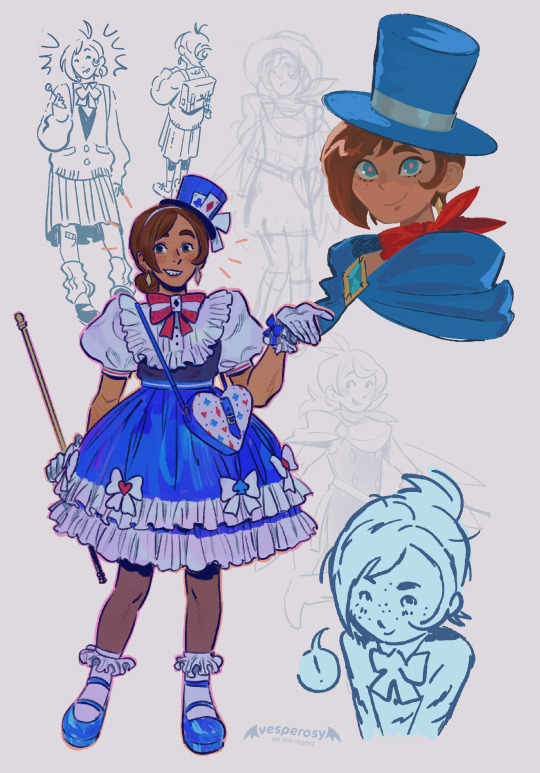

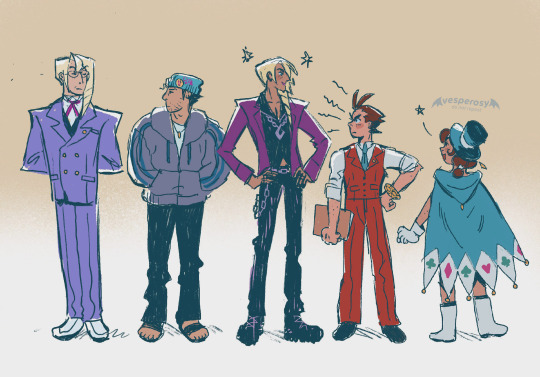
*hands you an ace attorney sketch dump*
#artists on tumblr#ace attorney#my art#my creativity has been pretty drained by my senior year thesis and my job this semester#so it's been fun to use aa characters to goof off and play with stylization#ok i gotta go work on my research report now. argh#sketch page#image id in alt text
4K notes
·
View notes
Text
pspsps tlt fans wanna take a survey for my class 👀
it's 11 questions (mostly multiple choice) inquiring broadly into how fans reacts to TLT's religion. it does touch on religious trauma, but only in-depth if you choose to provide in-depth responses, which you absolutely do not have to
you also do not have to be religious to answer! just to have read the series. responses and sharing would be greatly appreciated :)
#tlt#the locked tomb#gideon the ninth#harrow the ninth#nona the ninth#tamsyn muir#undergraduate research#if you see a second survey in the tags that would be one of my group members. who is inquiring into a different topic#that we will synthesize with our third into a report#there's more info in the survey itself#alright releasing this into the world your assistance in my research project would be very very helpful
472 notes
·
View notes
Text
Palantir’s NHS-stealing Big Lie
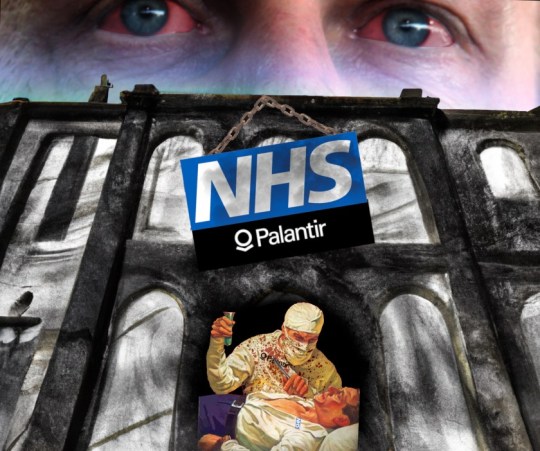
I'm on tour with my new, nationally bestselling novel The Bezzle! Catch me in TUCSON (Mar 9-10), then SAN FRANCISCO (Mar 13), Anaheim, and more!

Capitalism's Big Lie in four words: "There is no alternative." Looters use this lie for cover, insisting that they're hard-nosed grownups living in the reality of human nature, incentives, and facts (which don't care about your feelings).
The point of "there is no alternative" is to extinguish the innovative imagination. "There is no alternative" is really "stop trying to think of alternatives, dammit." But there are always alternatives, and the only reason to demand that they be excluded from consideration is that these alternatives are manifestly superior to the looter's supposed inevitability.
Right now, there's an attempt underway to loot the NHS, the UK's single most beloved institution. The NHS has been under sustained assault for decades – budget cuts, overt and stealth privatisation, etc. But one of its crown jewels has been stubbournly resistant to being auctioned off: patient data. Not that HMG hasn't repeatedly tried to flog patient data – it's just that the public won't stand for it:
https://www.theguardian.com/society/2023/nov/21/nhs-data-platform-may-be-undermined-by-lack-of-public-trust-warn-campaigners
Patients – quite reasonably – do not trust the private sector to handle their sensitive medical records.
Now, this presents a real conundrum, because NHS patient data, taken as a whole, holds untold medical insights. The UK is a large and diverse country and those records in aggregate can help researchers understand the efficacy of various medicines and other interventions. Leaving that data inert and unanalysed will cost lives: in the UK, and all over the world.
For years, the stock answer to "how do we do science on NHS records without violating patient privacy?" has been "just anonymise the data." The claim is that if you replace patient names with random numbers, you can release the data to research partners without compromising patient privacy, because no one will be able to turn those numbers back into names.
It would be great if this were true, but it isn't. In theory and in practice, it is surprisingly easy to "re-identify" individuals in anonymous data-sets. To take an obvious example: we know which two dates former PM Tony Blair was given a specific treatment for a cardiac emergency, because this happened while he was in office. We also know Blair's date of birth. Check any trove of NHS data that records a person who matches those three facts and you've found Tony Blair – and all the private data contained alongside those public facts is now in the public domain, forever.
Not everyone has Tony Blair's reidentification hooks, but everyone has data in some kind of database, and those databases are continually being breached, leaked or intentionally released. A breach from a taxi service like Addison-Lee or Uber, or from Transport for London, will reveal the journeys that immediately preceded each prescription at each clinic or hospital in an "anonymous" NHS dataset, which can then be cross-referenced to databases of home addresses and workplaces. In an eyeblink, millions of Britons' records of receiving treatment for STIs or cancer can be connected with named individuals – again, forever.
Re-identification attacks are now considered inevitable; security researchers have made a sport out of seeing how little additional information they need to re-identify individuals in anonymised data-sets. A surprising number of people in any large data-set can be re-identified based on a single characteristic in the data-set.
Given all this, anonymous NHS data releases should have been ruled out years ago. Instead, NHS records are to be handed over to the US military surveillance company Palantir, a notorious human-rights abuser and supplier to the world's most disgusting authoritarian regimes. Palantir – founded by the far-right Trump bagman Peter Thiel – takes its name from the evil wizard Sauron's all-seeing orb in Lord of the Rings ("Sauron, are we the baddies?"):
https://pluralistic.net/2022/10/01/the-palantir-will-see-you-now/#public-private-partnership
The argument for turning over Britons' most sensitive personal data to an offshore war-crimes company is "there is no alternative." The UK needs the medical insights in those NHS records, and this is the only way to get at them.
As with every instance of "there is no alternative," this turns out to be a lie. What's more, the alternative is vastly superior to this chumocratic sell-out, was Made in Britain, and is the envy of medical researchers the world 'round. That alternative is "trusted research environments." In a new article for the Good Law Project, I describe these nigh-miraculous tools for privacy-preserving, best-of-breed medical research:
https://goodlawproject.org/cory-doctorow-health-data-it-isnt-just-palantir-or-bust/
At the outset of the covid pandemic Oxford's Ben Goldacre and his colleagues set out to perform realtime analysis of the data flooding into NHS trusts up and down the country, in order to learn more about this new disease. To do so, they created Opensafely, an open-source database that was tied into each NHS trust's own patient record systems:
https://timharford.com/2022/07/how-to-save-more-lives-and-avoid-a-privacy-apocalypse/
Opensafely has its own database query language, built on SQL, but tailored to medical research. Researchers write programs in this language to extract aggregate data from each NHS trust's servers, posing medical questions of the data without ever directly touching it. These programs are published in advance on a git server, and are preflighted on synthetic NHS data on a test server. Once the program is approved, it is sent to the main Opensafely server, which then farms out parts of the query to each NHS trust, packages up the results, and publishes them to a public repository.
This is better than "the best of both worlds." This public scientific process, with peer review and disclosure built in, allows for frequent, complex analysis of NHS data without giving a single third party access to a a single patient record, ever. Opensafely was wildly successful: in just months, Opensafely collaborators published sixty blockbuster papers in Nature – science that shaped the world's response to the pandemic.
Opensafely was so successful that the Secretary of State for Health and Social Care commissioned a review of the programme with an eye to expanding it to serve as the nation's default way of conducting research on medical data:
https://www.gov.uk/government/publications/better-broader-safer-using-health-data-for-research-and-analysis/better-broader-safer-using-health-data-for-research-and-analysis
This approach is cheaper, safer, and more effective than handing hundreds of millions of pounds to Palantir and hoping they will manage the impossible: anonymising data well enough that it is never re-identified. Trusted Research Environments have been endorsed by national associations of doctors and researchers as the superior alternative to giving the NHS's data to Peter Thiel or any other sharp operator seeking a public contract.
As a lifelong privacy campaigner, I find this approach nothing short of inspiring. I would love for there to be a way for publishers and researchers to glean privacy-preserving insights from public library checkouts (such a system would prove an important counter to Amazon's proprietary god's-eye view of reading habits); or BBC podcasts or streaming video viewership.
You see, there is an alternative. We don't have to choose between science and privacy, or the public interest and private gain. There's always an alternative – if there wasn't, the other side wouldn't have to continuously repeat the lie that no alternative is possible.
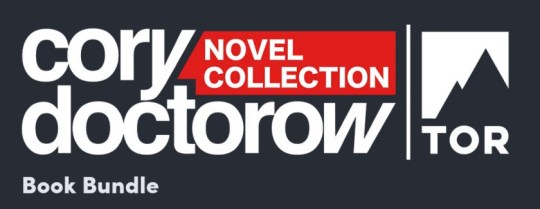
Name your price for 18 of my DRM-free ebooks and support the Electronic Frontier Foundation with the Humble Cory Doctorow Bundle.

If you'd like an essay-formatted version of this post to read or share, here's a link to it on pluralistic.net, my surveillance-free, ad-free, tracker-free blog:
https://pluralistic.net/2024/03/08/the-fire-of-orodruin/#are-we-the-baddies

Image:
Gage Skidmore (modified)
https://commons.m.wikimedia.org/wiki/File:Peter_Thiel_(51876933345).jpg
CC BY-SA 2.0
https://creativecommons.org/licenses/by-sa/2.0/deed.en
#pluralistic#peter thiel#trusted research environment#opensafely#medical data#floss#privacy#reidentification#anonymization#anonymisation#nhs#ukpoli#uk#ben goldacre#goldacre report#science#evidence-based medicine#goldacre review#interoperability#transparency
520 notes
·
View notes
Text
Y'all regularly send in questions wanting to know how to report concerns you've observed at zoos you've visited. I've been able to point people at the USDA (regulatory) option, but with regard to accrediting groups I haven't had a good answer. I spent the last six months or so really digging into why there hasn't been a good answer. What I've found is that the majority of zoological accrediting groups in the United States don't provide any way for the public to report issues they've observed at accredited facilities, and none of said organizations have a mechanism for truly supporting / protecting staff who might choose to report issues at their own facilities. Which is. not great.
I wrote a whole Substack post about it a few days ago, arguing that in order to remain credible institutions accrediting groups must facilitate public reporting, anonymous reporting, and commit to enforcing penalties for any retaliation against staff who choose to utilize the option. I'm linking it below for anyone who is interested in all the details. CW at the beginning for animal abuse mentions - I started the piece by discussing a truly egregious welfare situation that occurred last year at a Miami facility, which might have been prevented or at least caught earlier if the two groups that accredit the facility had had a reporting mechanism in place.
What I want to talk about here, though, is specifically why accrediting orgs need to not only have an anonymous reporting option for staff, but why they must ban retaliation and penalize any facility that does it anyway. Whenever something terrible happens at a zoo or sanctuary, people always ask "why didn't the staff say something?" And the answer is, basically, because taking that risk can get you not just fired, but blacklisted from the field. People literally end up having to choose between their careers and making noise about issues that aren't being resolved, and that's absolutely not freaking okay. But I want to explain for you the extent of the issue.
If you're not industry, something you might be surprised to learn is that most zoo staff don't have any special reporting options above and beyond what the public does. Most zookeepers and other low-level staff never interact with people from accrediting groups except during an actual inspection - so if there's a problem, it's not like they know someone they can back-channel a concern to if they don't feel safe reporting it publicly. And for the most part, reporting things your facility is doing to an accrediting group will always be considered inappropriate and probably get a keeper in trouble (even if it's a really valid issue).
The zoological industry runs on a strongly hierarchical system. Staff are expected to “stay within their lanes” and work within the established bureaucracy to resolve issues. Deviating from this, if staff feel like management are suppressing issues or something needs to be addressed urgently, is very heavily frowned upon. Basically, going around management to bring something to an accrediting group (or USDA, or the media) is seen as indicating that your facility has failed to address a problem, or that the individual making the report feels they know more than their superiors. At most places, no matter how extreme an issue may become, there's never a point at which it would be acceptable for a staff member to reveal a facility’s internal issues to their accrediting body.
The thing is, attempting to resolve issues through the proper internal channels at a facility doesn't always work! It can result in an issue being covered up (especially if the company is kinda shady) or suppressed rather than addressed. If staff decide to push the issue, it can really backfire and jeopardize their job, because it's expected that if management says something is fine, staff need to acquiesce and go along with it.
There have been a couple high-profile examples of this in the last decade: the incident I mention in my Substack where new management at the Miami Seaquarium decided to starve dolphins to coerce them into participating in guest programs, and an issue at the Austin Zoo five-ish years ago where the director was perpetuating serious welfare issues and ignoring staff feedback. In both cases, there's always the questions of where the accrediting group was. We don't know anything about what happened with the Seaquarium (it's been over six months since the USDA report documenting the diet cuts was released and AMMPA and American Humane haven't said a thing), but I remember hearing that ZAA had no idea what was happening at Austin because nobody had reached out to them about it.
This is why I'm arguing that all zoological accrediting groups need to make visible reporting options and make sure staff feel safe enough to use them! If you've got a facility perpetuating or not dealing with major issues, it's pretty probable that they're going to be unhappy if their staff reports those issues to any oversight body. That's not a situation where it's currently safe to speak up right now - and four out of five zoological accrediting groups in the US don't have standards prohibiting retaliation against staff for bringing up issues like that! (Surprisingly, it's not AZA. It's the sanctuary accrediting group, GFAS). Without any option for internal reporting, issues may not get addressed - which hurts animal welfare - or people risk losing their job, possibly their entire career in the field (which is a huge part of people's identities!), and their financial stability to advocate for their animals.
Currently, the two accrediting groups that do have reporting options (AZA and GFAS) stay they'll attempt to keep reports anonymous, but acknowledge it may not be possible to do so. (Which tracks, because zoo jobs are highly specialized and only a few people may be exposed to an issue). However, only GFAS prohibits facilities from retaliating against people who make reports. On top of that, there's absolutely no transparency about what happens next: GFAS, ZAA, AMMPA and AH have no information about how the process transpires and if someone making a report will get any information back about what happened. AZA straight up says that all accreditation stuff is proprietary (read: confidential) so you just have to trust that they dealt with it appropriately. Just yeet your report into the void and hope the groups doing oversight handle it correctly when there's no accountability? That's... not a great look for animal welfare concerns.
I hope the industry chooses to fix this problem. I hope it chooses to invest in transparency and increased credibility. I don't know what I expect, but I'd like to see these accrediting groups do the right thing.
My full write-up on how accrediting groups in the US handle reporting and concerns (or don't) is linked below.
2K notes
·
View notes
Text
Greg Reese Report 👇
The connection between 5G and the corona virus. 🤔
#pay attention#educate yourselves#educate yourself#knowledge is power#reeducate yourself#reeducate yourselves#think for yourselves#think about it#think for yourself#do your homework#do some research#do your own research#ask yourself questions#question everything#greg reese#greg reese report#news#connecting dots
603 notes
·
View notes
Text


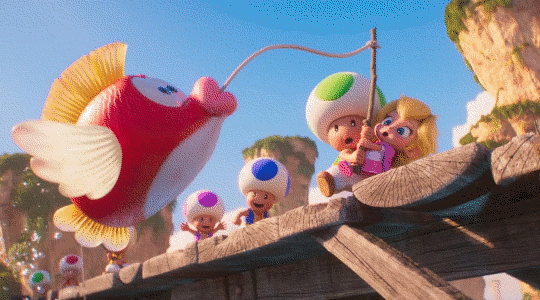


I don't know where I'm from. My earliest memory is arriving. I was so lucky they found me! They took me in, raised me like one of their own, and when I was ready, they made me their princess.
#mario movie#mario movie spoilers#super mario bros#princess peach#super mario bros movie#super mario bros movie spoilers#cherrysip edits#mario movie was like ' let me just drop some wild new lore in here and then not come back to it in any way' lolol#DOES PEACH HAVE PARENTS BACK IN THE REGULAR WORLD THAT MOURN HER TO THIS VERY DAY????#i don't know how feasible this would be but it feels like you could do some research to look up reports of missing children matching her#description over the last couple of decades and see if anything intriguing comes up :O#but i do love how this makes the relationship between peach and the toads so much more emotional and meaningful#they're not just her subjects. they saved her and gave her a loving home!!! they are her family and she would do anything for them!!!#they cared for her and now she cares for them even if it requires self-sacrifice#(another intriguing detail: the castle already exists here. did the toads have another monarch before this???)#(have they just been making unsuspecting humans wandering through the pipe royalty for hundreds of years????? HMM)
654 notes
·
View notes
Text
If there's one thing about Clark Kent, it's that when he or someone he knows has a problem, he WILL read a book.
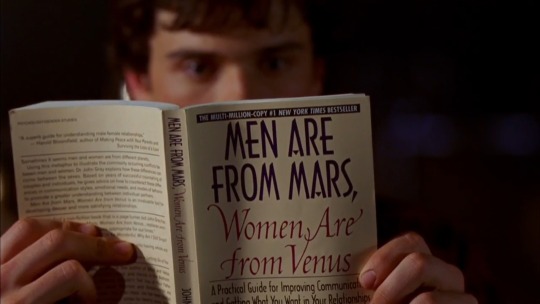
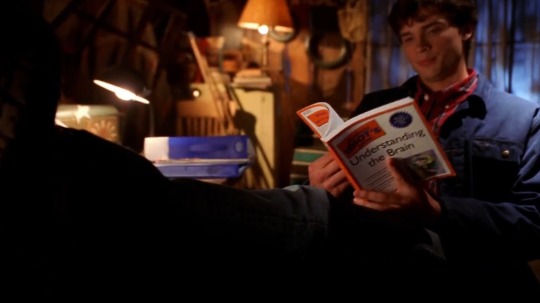
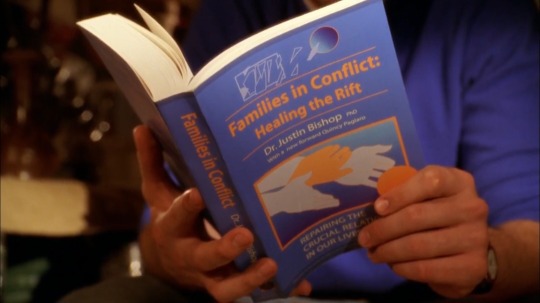

Smallville | 1.19 | 2.08 | 2.12 | 2.18
#no but seriously I like this aspect of his character#it really paves the way for his future as a reporter#cause at first glance Chloe is blatantly a reporter but Clark is more subtle with his ability and willingness to go down on research#blorbo of all time#clark kent#smallville#pics are mine#my post
196 notes
·
View notes
Text
Future Crunch just paywalled their good news for "Energy" and "Technology"??? Which it looks like is about half of all their Good News?? (x)
I'm not particularly surprised because I WAS wondering how they made enough money to stay solvent, but I am dismayed
Partly on my own principles and partly because this kinda feels like it does/should go against their whole ethos??
Like if your big mission statement is "If we want to change the story of the human race in the 21st century, we have to change the stories we tell ourselves" (x) ....maybe you shouldn't paywall those stories???
That sounds very counterproductive and like you're taking access to good news away from a lot of people who need/want to hear it the most??? Esp in people in countries whose currency is much weaker than the US dollar??
#not news#I debated about posting this bc it's technically kinda bad news#but future crunch is one of the highest quality sources of good news I've found#in terms of breadth and research#and especially for non-US and non-Western#they pull a lot of their good news from WHO reports and the like#it was maybe the biggest site/influence in terms of catalyzing me to go “wait maybe we CAN do this”#“maybe we CAN survive”#so it's a huge shame and I feel obligated to comment on a fellow (if way bigger and very different) Good News Outlet#part of me is tempted to subscribe for my own sake and to be able to post the articles they post about to this blog#if you're not familiar with future crunch it's a giant roundup with 1-5 sentences per topic#so I could easily link to the things they link#but a) again I resent this on my very strong freedom of information / anarchist adjacent principles#and b) not til I get a new day job lmao#me
92 notes
·
View notes
Text
okay it's 1pm and i willingly unprompted said to my mate 'hey if we make this a competition on who can finish our finance report first that'll make us way more productive' (bc we're both hateful people) and she agreed and our deadline is 3pm i will keep you posted
#the fact im girlblogging at 1:09 when time started at 1 speaks volumes#tbh though ive got all the hard shit of the report down like i made all my datasets tables graphs AND variables already#and ive done all the research and written an essay plan i literally JUST need to type it up#which everyone keeps hyping me up about like 'writing is your forte this is easy for you' they're right too teehee#but BECAUSE i know it'll be easy i just cannot be fucking ARSEDDDDDDD ive been putting it off all day#hence deciding to make it a competition bc if there's one thing me and this bitch can do it's be spiteful little assholes#i HAVE to beat her#hella goes to uni
78 notes
·
View notes
Text


batman: shadow of the bat #0
[ID: a flashback of the outside of Wayne Manor at night. A narration box (unrelated to the scene) reads, “Ya think he's got a guardian angel, or somethin'?” Inside the manor, Leslie Thompkins and Alfred Pennyworth are talking in regards of young Bruce Wayne. They sit in a magnificent library at a small table as Bruce sits at his own desk that's across the room and has his face buried in a book. Alfred reassures her, “— Worried about him, Doctor Thompkins? I can assure you there's no need! Master Bruce has the manor to live in — myself to look after him — the best education money can buy—”. Leslie cuts Alfred off before he can continue rambling out more examples. She tells him, “It's what he doesn't have that bothers me, Alfred. Friends — hobbies — the kind of life a normal teenager looks forward to. He spends all his time in the gym, or here reading. I don't think he ever recovered from his parents' death.” We're shown Bruce, now in a close-up and able to see the book he's reading is titled ‘Lip Reading For Beginners’. Bruce peers over the book intensely as Leslie continues to express her rightful concern, “He almost seems obsessed!” END ID]
#baby brucie#love you leslie.... sorry you have to deal with the most insufferable male characters....#also side tangent maybe but i HC bruce having hearing lost because he was in an alleyway when a gun fired twice right near him#so the >:3 part of my brain loves thinking of bruce not even getting to hear the eulogy or answer a police report because of the tinnitus#that's still ringing in his ears. having his entire already lonely life destroyed because his parents were brutally murdered#and then having the permanent reminder and something that effects his senses in his every day#batman uses IIC or CIC and has amplified sound from his cowl. bruce uses BTE/RITE ones btw... if you even care.#i have mild hearing loss and tinnitus since i was a kid bc haha trauma & i had this HC since i got into batman so i have done so much#fucking research on different hearing aids and how the ear functions and such for personal AND projection purposes 👍#anyways. do you think leslie and alfred have ever explored each others bodies.#c: batman: shadow of the bat | i: 0#crypt's panels#bruce wayne#leslie thompkins#alfred pennyworth#disabled bruce#bruce's childhood
261 notes
·
View notes
Text
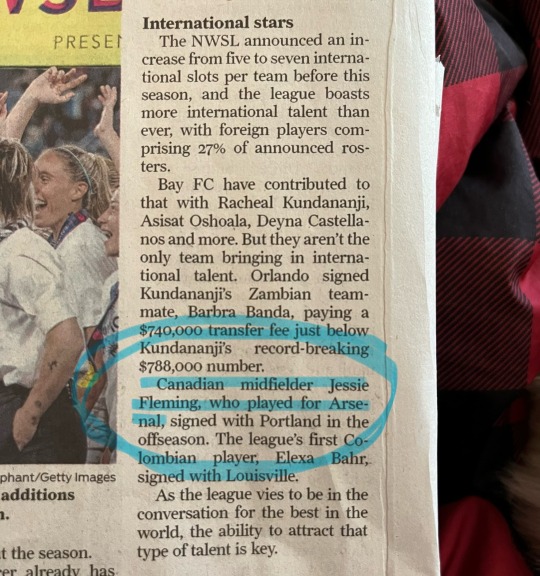
this sf chronicle reporter woke up and chose violence, embarrassing herself in the process
#same article says all uswnt players except horan play in the nwsl#respect these women enough to do some research i’m begging#this is the reporter assigned to bay area women’s soccer and i swear the number of times i’ve been like no that’s wrong lmao#this is about soccer#jessie fleming
48 notes
·
View notes
Text

done with classes for the semester 👍
#ive been finishing my lab reports and research assignments lately#got a good 2/3 weeks to relax then the dreaded exams in january...#and more report writing#next legacy post is dialogue but the last#thing i wanna do is write or think 😴#how is everyone doing?#gameplay update#rambles
55 notes
·
View notes
Text
let out the biggest “ohhhh myyy goooddddd” when i found out that the chess moves dutch was reciting to himself was called “dutch’s defense”
#i need to crawl inside his brain and live there for a few months#set up a base camp so i can conduct research#and report back here with my findings#dutch van der linde#red dead redemption#rdr2
75 notes
·
View notes
Text
can yall do me a favor for a research project:
in the tags, reblog and use first three adjectives that come to mind to describe one of your favorite fictional characters (you can tell me who they are or not, can also be oc or not)
in the next tags or comment, use the first three adjectives that come to mind to describe one real person you are a fan of (again, you can tell me the names or not)
#thanks i have to write a report about it and need at least ten people LMFAO#most people i know are on tumblr hence :)#ashley rambles#in the tags#in the comments#research purposes#linguistics paper etc etc
49 notes
·
View notes
Text
Greg Reese Report 👇 (Old Video)
Did the government start the fires in maui?🤔
#pay attention#educate yourselves#educate yourself#knowledge is power#reeducate yourself#reeducate yourselves#think for yourselves#think about it#think for yourself#do your homework#do some research#do your research#do your own research#ask yourself questions#question everything#greg reese report#greg reese#news
915 notes
·
View notes